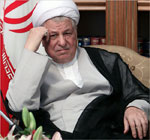 Los Angeles Times: Iranians must wait until next week to find out who will be on the ballot in next month’s presidential election, a key electoral panel said Thursday, as it continued to mull the fate of two prospective candidates who have shaken up the race. Los Angeles Times
Los Angeles Times: Iranians must wait until next week to find out who will be on the ballot in next month’s presidential election, a key electoral panel said Thursday, as it continued to mull the fate of two prospective candidates who have shaken up the race. Los Angeles Times
 The Guardian Council is expected to approve 10 candidates. It is still mulling the fate of two last-minute prospective candidates who have shaken up the race.
The Guardian Council is expected to approve 10 candidates. It is still mulling the fate of two last-minute prospective candidates who have shaken up the race.
By Ramin Mostaghim and Patrick J. McDonnell
TEHRAN — Iranians must wait until next week to find out who will be on the ballot in next month’s presidential election, a key electoral panel said Thursday, as it continued to mull the fate of two prospective candidates who have shaken up the race.
The Guardian Council, which vets office seekers, said it needed an extension until Tuesday to judge the suitability of the nearly 700 presidential aspirants.
A council official told reporters that 10 or more candidates may be approved, a relatively high number that could make it difficult for one to win a majority without a runoff election.
The delay had been expected, but it also prolonged the suspense for people newly enthused about the June 14 balloting after the eleventh-hour sign-up of two well-known figures: former President Ali Akbar Hashemi Rafsanjani, long a fixture in Iranian politics, and Esfandiar Rahim Mashaei, top aide to outgoing President Mahmoud Ahmadinejad, who cannot seek a third term under Iranian law.
The pair’s presence has energized the nation’s previously desultory preelectoral tableau.
The two represent opposing camps that stand as bitter rivals in the intricate and at times brutal world of Iranian politics. Their names and fates are now paradoxically entwined.
Each has weathered what supporters call a vicious smear campaign since they decided separately to enter the electoral fray in theatrical fashion, signing up minutes before the deadline for submissions on Saturday.
The gambit has generated considerable buzz in Iran and outside the country, boosting interest in a contest previously seen largely as the domain of establishment loyalists.
The intrigue has come to dominate headlines here and focused attention of the secretive deliberations of the Guardian Council, composed of a dozen clerics and jurists of establishment pedigree.
The vitriol directed at the two latecomers has left little doubt that the presence of one or both on the ballot is viewed as a direct challenge to the ruling coalition of hard-line clerics and like-minded allies in the Revolutionary Guard and other mainstay institutions.
Both politicians are regarded as estranged from Iran’s supreme leader, Ayatollah Ali Khamenei, who has the final say on most matters of state.
Rafsanjani, a stalwart of the 1979 revolution, has been disparaged as an abettor of “sedition” for his support of the reform current in the last presidential balloting, in 2009, when Ahmadinejad won a second term amid ¿allegations of vote rigging that led to widespread street protests.
The 78-year-old former chief executive has also been termed too old for the post. But reformers have now gravitated to his candidacy, viewing the pragmatic Rafsanjani as capable of reducing Iran’s international isolation and of invigorating an economy battered by Western sanctions.
Mashaei, Ahmadinejad’s protege and in-law, has been attacked with even greater fervor. Detractors have labeled him the mastermind of a “deviation” current that elevates nationalism above Islam. Some commentators have even hinted he may have an almost occult hold over Ahmadinejad, his longtime mentor. Mashaei has also been accused of financial irregularities while serving as the president’s key aide.
Still, Mashaei is widely regarded as a charismatic figure who could appeal to both Ahmadinejad’s working-class populist base and to urban dwellers dissatisfied with the theocratic elite.
This week, a group of 100 lawmakers wrote to the Guardian Council asking that both candidates be rejected as “seditionists and deviants,” the conservative Mehr News Agency reported.
Doing so would probably diminish voter enthusiasm and erode credibility in the electoral process. That could spark a crisis of legitimacy at a crucial moment when Tehran is at loggerheads with the West about its disputed nuclear program.
If Rafsanjani or Mashaei are barred from running, “the legitimacy of the whole system will be questioned,” said Farshad Qorbanpour, an analyst who was among many reformists jailed after the disputed 2009 election.
The presidential field also features a trio of establishment candidates: Mohammed Baqer Qalibaf, the mayor of Tehran, who has been linked in a recently released audio recording to violent attacks on protesters; Ali Akbar Velayati, the supreme ruler’s top foreign policy advisor; and Saeed Jalili, Iran’s chief nuclear negotiator, whose high-profile position has afforded him considerable public exposure in the election year.
Special correspondent Mostaghim reported from Tehran and Times staff writer McDonnell from Beirut.


